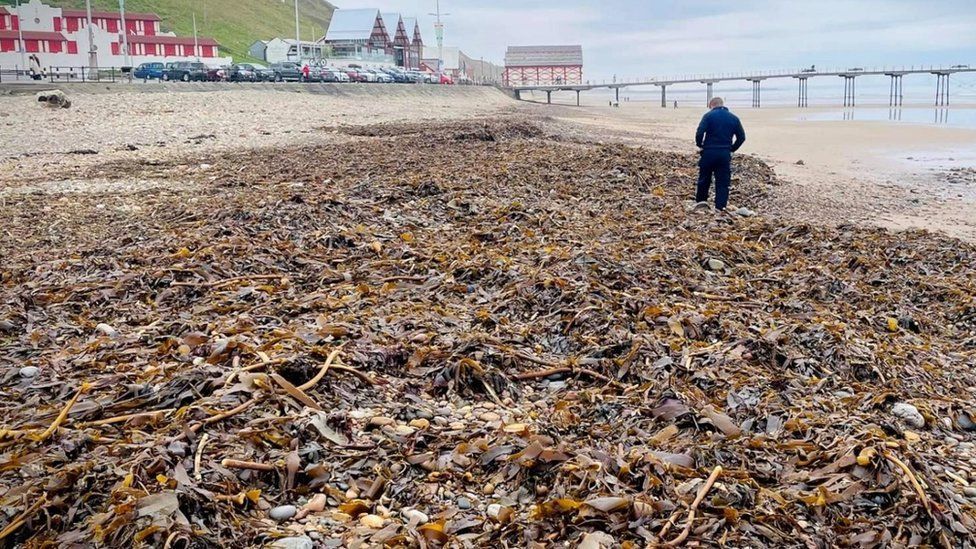ARTICLE AD BOX
 Image source, Joe Redfern
Image source, Joe Redfern
Dead crustaceans have washed up at several spots along the North East and North Yorkshire coast
By Richard Moss
Political editor, North East & Cumbria
When thousands of crabs began washing up dead off Teesside and North Yorkshire's beaches in October 2021, it was a tragedy for the local fishing industry, and the environment.
But it also set off a row that shows little sign of dying off.
It ignited once again at Prime Ministers' Questions: Rishi Sunak had to defend the government's approach as local Labour MP Alex Cunningham, told it to "get serious" about what caused the deaths.
The row has also played out on the opinion pages of The Times this week. The newspaper accused the government of an inadequate response, while the Teesside Conservative MP and former Levelling Up Secretary Simon Clarke responded by saying "crude" political opposition was behind accusations of a cover-up.
At stake is not just the health of sea life, but also the future of a key part of the government's levelling up agenda - the creation of a freeport offering tax breaks to lure businesses to Teesside.
An investigation by the Department of Environment, Food and Rural Affairs said the most likely cause of the 2021 die-off was a naturally-occurring algal bloom. Devastating for fishing, but seemingly unpreventable.
It was a conclusion that many in the fishing industry did not believe. Instead, they suspected it was industrial toxins released during the dredging of the River Tees.
Image source, Getty Images
Image caption,Fishermen have staged protests against the pollution
They commissioned their own report from researchers at four northern universities. In September 2022, those academics concluded that the crabs were more likely to have been poisoned by pyridine - an industrial chemical that is present in the river's mud.
This is where the freeport and the thousands of jobs the Conservatives are promising there becomes an issue.
If poisons from the Tees were responsible, they can only have been stirred up by what's called maintenance dredging. This is work that has been carried out for decades to keep the river navigable for ships.
Nothing to do ostensibly with the freeport plan, as no dredging for that had taken place before the deaths of the crabs.
But a call by the fishing industry and Labour MPs for the suspension of dredging was still likely to have an impact as there were plans to remove an extra amount of silt for a crucial development in the freeport. What is known as capital dredging was needed to allow the construction of a new quay for a factory that will soon build giant wind turbine piles.
Preventing that could threaten the first economic fruits of the freeport. Government scientists, ministers, and the Tees Valley Mayor, Ben Houchen, then have held the line, insisting that the algal bloom was still the likely cause, and that the presence of pyridine was unsurprising as it naturally occurs in crustaceans.
The dredging began last autumn, with Mr Houchen keen to point out there has been no repeat yet of the 2021 die-off.
That did not settle the matter for the fishing industry, or many local Labour politicians. It all got personal when protesters last month turned up outside the freeport site wearing Ben Houchen masks, and calling again for dredging to halt.
In response Mr Houchen and Teesside's Tories have accused their opponents - and particularly Labour - of trying to wreck the freeport plan. In The Times, Simon Clarke referred to them as an "anti-growth coalition" who can't face the fact that it is Conservatives "restoring pride, identity and purpose" to the area.
It is hardly surprising that politics should play a part. Teesside will be a crucial battleground at the next election. The Conservatives have largely been beating Labour there since 2017, something Sir Keir Starmer needs to reverse.
Image source, Getty Images
Image caption,Mr Houchen has said the freeport would add more than £3bn to the economy once fully developed.
Labour though believe the Tories are big on rhetoric and short on results in their promise to transform the area. Denting the popularity of Ben Houchen is an aim, even if they are convinced their cause is a noble one.
A new chapter in this dispute though is about to begin. In October, the House of Commons environment committee spent a day reviewing the evidence. Although its members did not call for dredging to be halted, they did urge the government to re-examine the competing theories.
That report could come as soon as next week, but will it draw a line?
There has already been concern about transparency. Ms Coffey has not revealed who is sitting on the panel, or what its frame of reference was, even though she has been urged to do so by the Conservative environment committee chairman Sir Robert Goodwill.
There is every chance yet that its conclusions may not satisfy Labour MPs or the fishing industry that there is no attempt to cover up a scandal. Conservatives will continue to accuse opponents of playing politics.
It seems likely the legacy of those dead crabs will still be haunting the area when the next General Election comes.

 2 years ago
133
2 years ago
133








 English (US) ·
English (US) ·